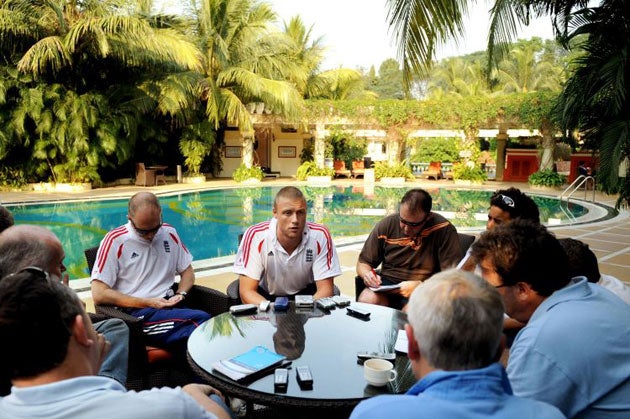Flintoff bemoans IPL skills gap
England players 'found wanting' by absence from elite Twenty20 league

Your support helps us to tell the story
From reproductive rights to climate change to Big Tech, The Independent is on the ground when the story is developing. Whether it's investigating the financials of Elon Musk's pro-Trump PAC or producing our latest documentary, 'The A Word', which shines a light on the American women fighting for reproductive rights, we know how important it is to parse out the facts from the messaging.
At such a critical moment in US history, we need reporters on the ground. Your donation allows us to keep sending journalists to speak to both sides of the story.
The Independent is trusted by Americans across the entire political spectrum. And unlike many other quality news outlets, we choose not to lock Americans out of our reporting and analysis with paywalls. We believe quality journalism should be available to everyone, paid for by those who can afford it.
Your support makes all the difference.Andrew Flintoff yesterday apportioned a sizeable amount of the blame for England's poor one-day showing in India to the fact that he and his team-mates are yet to play in the Indian Premier League. England are 4-0 down in the seven-match series and Flintoff believes that India's leading players have benefited enormously from playing with the world's top cricketers in the IPL, participation that has left England's cricketers lagging behind.
"I think through playing the shorter form of the game they [India] have developed new skills with both bat and ball, and we have been found wanting a little bit," Flintoff admitted. "Their game has developed through playing Twenty20 cricket, you just have to look at the way the guys hit the ball and the positions they get into. You also look at the bowling skills that Zaheer Khan and Ishant Sharma have too. They are developing slower balls and yorkers.
"A few of our players are keen to go to the IPL. The thing that most people write about when they mention the IPL is the financial rewards, but it should also be looked at as something that helps with a player's development. It is not just the Indian players who have benefited from it and taken their game forward. Look at Chris Gayle from the West Indies, he has too. We have a Twenty20 World Cup in England next summer and it would be good if the lads were given the chance to have a g o in India."
Flintoff's comments have merit. From a cricketing point of view, Kevin Pietersen's side would benefit from playing in the IPL because the advent of Twenty20 has led to new hitting techniques being considered and used. But the view, which is being echoed by other senior figures in India, does appear to be a convenient excuse for what is now a month of rather unimpressive cricket from England. Nobody was mentioning the absence of English players from the IPL when the team were walloping South Africa 4-0 10 weeks ago, and had England won the final match in Cardiff they would have been ranked the second-best one-day side in the world.
Virender Sehwag and Yuvraj Singh are batting no differently now than the last time England toured in 2005-06; they are just damn fine players. And as for yorkers and slower balls, bowlers have been bowling those well for years. There is nothing new there.
The biggest change Twenty20 has made is to the state of mind of players, particularly batsmen. The game has allowed willow-wielders to realise what can be achieved if they put their mind to it. The best now play fearless cricket, and when somebody fully commits to something, whether it be a straight hit or a slower ball, it is more likely to come off.
Such an approach enabled three Indian players to strike the first ball they faced for six while England's players currently need to play several balls before they would even consider such an extravagant stroke.
The England team may not have the God-given dexterity of their opponents here but they are highly skilled, as they showed against South Africa. What they need is belief, the confidence to feel that if they try something it will be completed successfully. At the moment this is not the case. If this belief returns and England stop relying on the same three or four figures in each game they will be competitive.
England play India in the fifth one-dayer in Cuttack, in the state of Orissa, tomorrow, and the tourists are desperate to end the possibility of the series becoming a 7-0 whitewash. India are threatening to change their line-up to give senior players a rest and youngsters experience.
Flintoff was full of praise for Mahendra Singh Dhoni's side, insisting that he did not want to be rested and that England still have plenty to play for. "India are a very strong side and they have outplayed us in every department in each of the four games," he said. "We have three games left and we have to take something out of them. We can't win the one-day series but we have to try to take something in to the Test series, which starts in three weeks' time.
"I am keen to play in every game. The schedule is not too demanding. A lot of lads in the team have things to play for. People are establishing spots in the team and we have pride to play for. It has taken a bit of a knock in the last four games, being outplayed in the manner we have. But there is no such thing as a dead game when you are playing for England."
Flintoff is one of the few England players in credit and Pietersen will be hoping others follow his example.
Join our commenting forum
Join thought-provoking conversations, follow other Independent readers and see their replies
Comments